Lieutenant General Jacob Farj Rafael Jacob (retired) -- Jake to his friends -- passed into the ages on Wednesday, January 13, 2016.
In his honour, we re-publish this fascinating December 2006 special story where the man who masterminded the liberation of Bangladesh in 1971 walked down memory lane in an exclusive chat with then Deputy Managing Editor Ramananda Sengupta.
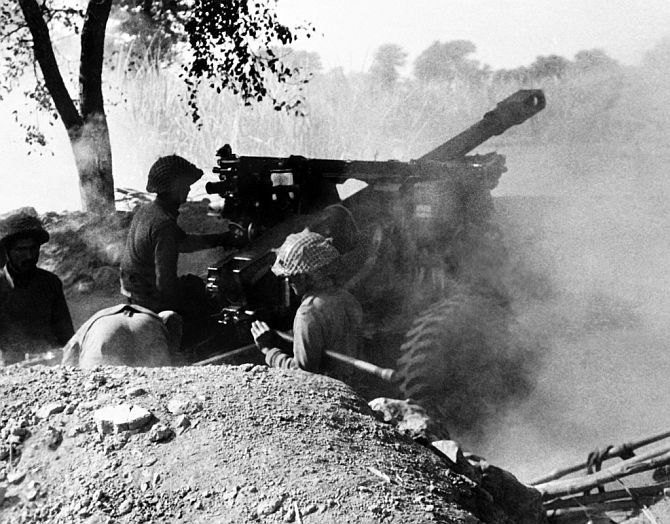
The crackdown (by West Pakistan on East Pakistan) took place from March 3rd to the 26th. The Indian government was very concerned over the large number of refugees that kept coming in.
In the beginning of April, General (S H F J) Manekshaw (below, left), the army chief, called up to say that the government required the army to move into East Pakistan immediately. I told him that was not possible because we had mountain divisions and no bridges, and there were a large number of rivers between us and Dhaka, very wide and unbridged.
The monsoon was about to break, our divisions were not trained in riverine warfare, we had no transport (mountains divisions have very little) and it was not possible for us to move in.
So he said he would come back to me. When he came back the next day, he said they were accusing him and the army of being cowards. So I told him, "You tell them that it's not you, it's the Eastern Command that's not moving."
"When the bloody hell can you move by?" he asked.
"If you give me the bridges and other stores required, and the time for training, not before 15th of November," I replied.
Why?
I said because by the 15th of November the ground would have dried up, and we should be able to move. So that was that. After that Manekshaw went to Mrs Gandhi and the Cabinet and briefed them.
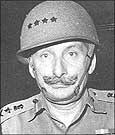 So we knew a war was coming, and I made a plan to capture East Pakistan. I knew that the Pakistanis would defend the towns, so the main strategy of that plan was that Dhaka was to be our final and principal objective, since it was the geopolitical and geostrategic heart of then East Pakistan.
So we knew a war was coming, and I made a plan to capture East Pakistan. I knew that the Pakistanis would defend the towns, so the main strategy of that plan was that Dhaka was to be our final and principal objective, since it was the geopolitical and geostrategic heart of then East Pakistan.
In each of the other sectors, for instance in the Jessore sector, we selected objectives like communications centres.
So we decided to bypass the towns and use subsidiary tracks and head straight for Dhaka. We never wanted to capture any town, because capturing a town takes a long time. I knew the war would be short, I knew the UN was bound to intervene, so we couldn't spend time capturing towns. You see how much the time Americans took to capture the town of Fallujah in Iraq?
So the strategy was, draw them to border, use subsidiary tracks to bypass the towns and defences, and head for Dhaka from all directions.
Meanwhile, the refugees from East Pakistan were coming in. Tajuddin (the Awami League leader and later Bangladesh's prime minister in exile) and others were set up in Calcutta. I helped them with the initial draft of their declaration of Independence, by giving them a rough draft which they took around and then then suitably enlarged.
So the government orders us to help the Mukti Bahini, camps were set up in the border areas, and they were trained and armed by various agencies.
The Mukti Bahini, and later the East Bengal batallions, had a major role to play in the liberation of Bangladesh. They created the environment in which the Pakistani army was completely demoralised and they couldn't move from one place to another without being attacked. Their contribution was enormous. They attacked the communications and reduced the morale of the Pakistani army, making it much easier for us.
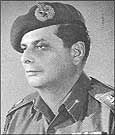 (General Jacob, left) As for the war plans, I had worked out a strategy when I was a brigade commander and also as GOC (General Officer Commanding) 12th division. I produced a desert warfare book in 1969 in which I laid down these principles. This was later incorporated in the army training manual.
(General Jacob, left) As for the war plans, I had worked out a strategy when I was a brigade commander and also as GOC (General Officer Commanding) 12th division. I produced a desert warfare book in 1969 in which I laid down these principles. This was later incorporated in the army training manual.
The Indian Army was so far used to moving on metalled roads with supplies following it. I said "Nonsense! You move on subsidiary tracks and open a supply route later. Go self contained, bypass. The main roads can be opened later, so you don't have to depend on it for some time."
The main problem was logistics, which was critical in winning that war. So in May 1971, even before we received any orders from anyone, we started building up the logistics in Tripura for one corps, throughout the monsoons, before any orders arrived from Army HQ.
Similarly in Tura and other places, we got the Borders Roads Organisation to make the roads, made hospitals airfields, etc. In May I sent a plan to Army HQ giving Dhaka as a principal objective and allocation of troops. HQ sat on it for some time, and it was only in August that General Manekshaw and his Director of Military Operations K K Singh turned up and gave us the following plans.
The orders, which were issued in writing and never changed, said that we would capture the entry ports of Khulna and Chittagong, and our thrust weighted accordingly. That's all.
I argued that we had to take Dhaka, and I was told no, if we took Khulna and Chittagong the war would be over. I asked how, since Khulna was nothing but a minor river port 30 miles from our border. Chittagong was peripheral. So these arguments went on for some time, and the only change that Manekshaw made was that he removed the word weight.
So the orders we went to war with was to capture Khulna and Chittagong. Dhaka was not mentioned anywhere.
We did not take Khulna, and we did not capture Chittagong, yet we won the war.
I had to find troops for Dhaka. There was 6 Mountain Division which was kept in the north for Bhutan. So I begged for troops from that division, but was told that I was not going to get them, because the Chinese were likely to attack. Manekshaw refused to give me any troops from the north to take Dhaka.
I was given a para batallion group. I planned to drop it at Tangail and I signed the orders for that in October. We laid down in that the drop would take place on D +7, and the link up would be in 24 hours. It occurred exactly as we had planned.
We sent Captain P K Ghosh of 50 Para Brigade in November to Tangail with 'Tiger' Siddiqi, a former Pakistani armyman, to lay out the dropping zone. But I had to find troops. The two divisions that were in Mizoram and Nagaland had no artillery. Therefore I moved all the artillery from the Chinese border to make these divisions up. I also moved down three brigades for the Dhaka thrust. Things were moving.
The Mukti Bahini operations finished on the 30th of November. So I told the army commander, Lieutenant General J S Aurora below left), that this is the plan for Dhaka, and he said he would inform Manekshaw. I said don't inform him, because Manekshaw has said the Chinese are likely to attack, and he doesn't know about this move. And also he does not think Dhaka is important.
The new DMO (Director of Military Operations), Inder Gill, and I got along well, and he helped me in this. But nothing was conveyed to Manekshaw about this until November 30, when Aurora sent him a signal saying that I had moved these brigades down to capture Dhaka.
The answer came in two hours and read like this: "Who told you to move these brigades? You will move them back at once!"
So an agitated Aurora came in asking what do we do, and I told him and that I would take care of it. When I called up Gill, he said: "Why the hell did you have to send that stupid signal? Manekshaw is shouting at me for not telling him about it."
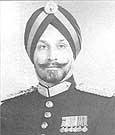 So I said I hadn't sent that message, and that there's no way I would send those brigades back. We all know the war is going to start, and we all know that if I send them I will never get them back in time.
So I said I hadn't sent that message, and that there's no way I would send those brigades back. We all know the war is going to start, and we all know that if I send them I will never get them back in time.
"Jake," he said, "don't send them back, but please do not commit them into Bangladesh without Army HQ sanction, because the chief is adamant."
"Inder," I replied. "I give you my word."
I never knew that once the war started, Manekshaw would would not allow us to move those brigades into Bangladesh until December 8.
On December 3, Manekshaw rang me up in the evening saying they have bombed our airfields in the west, and I said I take it the war has started. He said yes, you go ahead. Mrs Gandhi, he said, was in Calcutta, so please inform her, and I said okay.
I then told Aurora that the war has started, I have to prepare the orders, so please you go and inform her at Raj Bhavan. So I tied up the air support and issued the orders.
The war had begun.
Though no war goes completely according to plan, this one went off reasonably well, and on December 13, we were outside Dhaka.
The advance from the north went off well, and though the move of the two brigades was delayed the paradrop took place as planned. By December 13, we had about 3,000 troops outside Dhaka.
Meanwhile the American fleet was moving into the Straits of Malacca. Some in Delhi were panicking. The radio signals we were intercepting from Islamabad to the Pakistani forces in the east said "Fight on, you are getting help from yellow (China) from the north, and white (America) from the south."
Niazi believed this.
On December 13, there was an American resolution at the United Nations, which was vetoed by the Soviet Union. The Soviets said no more vetos. (Then Chief of the Army Staff S H F J) Manekshaw reacted and sent us an order to capture "all the towns in Bangladesh except Dacca." Listing every single one that we had bypassed.
We were outside Dhaka, still no mention was made to capture Dhaka!
Not only that, he copied the order down to the three corps. So we rang the corps to tell them to ignore these orders.
(Lieutenant General Jagjit Singh) Aurora (then General Officer Commanding Eastern Command) came agitated into my room, showing me the signal and saying this was was all my fault because he wanted to capture the towns, and I did not support this view. Further, I had opposed operations to capture Sylhet, Rangpur and Dinajpur and other towns in East Pakistan.
So I got hold of Niazi on the wireless that night and explained that our forces outside Dhaka were very strong, a Mukti Bahini uprising was imminent, ethnic minorities would be protected and that they ( the Pakistan army) would be treated with dignity if they surrendered.
On December 14, I got an intercept that there was a meeting at the Government House in Dhaka. There were two government houses in Dhaka, so we took an educated guess, and fortunately it was the correct one. The Indian Air Force bombed it within two hours. The governor of East Pakistan resigned.
About 4 pm that afternoon, Niazi and Major General Farman Ali went to see Spivack, the American consul general, with the following proposals:
- Ceasefire under the United Nations
- Withdrawal under UN
- Handover of the government to the UN, and
- No war crimes trials and other stipulations
I got to know about it through one of the embassies. So I informed Manekshaw, who spoke to the American ambassador in India, who didn't know anything about it. That same day, the American embassy in Islamabad sent it to New York, and it was given on December 15 to (then Pakistan foreign minister) Zulfiqar Ali Bhutto. He refused to accept it. The Americans then gave it to us.
On December 15, the ceasefire was ordered.
A resolution by Poland, part of the Soviet bloc, was introduced at the UN on December 15 evening in New York, which was the morning of December 16 our time. Bhutto tore it up in rage, because it did not condemn India as an aggressor.
On the morning of December 16, Manekshaw phoned me and said: "Go and get a surrender."
"On what terms?" I asked. "I have already send you a draft surrender document. Do I negotiate on that?"
"You know what to do, just go!" he replied.
Then I made a mistake. I told him that when I was talking to Niazi, he had invited me for lunch, and I forgot about it. On the staircase, I met Mrs Aurora, and she told she was going to Dhaka with her husband. "My place is beside my husband," she said.
I was changing helicopters at Jessore to get to Dhaka, when a man came running to me with a signal from Army HQ. I opened it, thinking good, now I have some orders.
I was unarmed, and carrying the document which I had typed and sent to Delhi. A staff officer was with me, that's all. I opened the letter, and it said: "The government of India has approved of General Jacob having lunch with Niazi." Who wanted their permission?
Anyway, I landed at Dhaka still carrying this paper which I had sent to Delhi. On my arrival, I was met by the UN representatives who said we are coming with you to arrange the withdrawal of the Pakistani army and the takeover of the government.
I said thank you very much, I don't need your help.
Fighting was going all around Dhaka between the Pakistani troops and the Mukti Bahini. A Pakistani brigadier met me at the airfield to guide me to Niazi.
En route, We were stopped by a unit of the Mukti Bahini, who refused to let us proceed. We are going to attack Niazi's headuarters, they said. "He is surrendering, please let me go," I said. The Time magazine reporter who was there said I threatened to shoot them. I said no such thing. I didn't have a weapon to shoot them with!
A long argument took place with the Mukti Bahini, until I said, "Look, your new government is coming in tomorrow, and Niazi wants to surrender, for God's sake let us go!" Finally they let us go. I arrived at Niazi's headquarters, where I had the draft surrender document read out to him.
This is an unconditional surrender, he said. "You have only come here to discuss the ceasefire and the withdrawal of the Pakistani army."
"General," I replied, "this is not unconditional, I have worked on this for some time. I had put in it that we would protect ethnic minorities, that we would ensure the safety of them and their families, that they would be treated with dignity as officers and men according to the Geneva Convention. So it is not unconditional. Where would you find all these conditions laid down?"
But he said no.
I had thought he had 25,000 troops in Dhaka. He told me had 30,000.
I listened to the arguments for some time. His aides like Farman Ali were advising him not to surrender.
Finally, I told him, "Look general, you surrender, I will ensure your safety, the safety of your families, ethnic minorities, everyone. You will be treated with respect. If you don't I am afraid I can take no responsibility for what happens to you or your families. What is more, we will have no other option but to order the immediate resumption of hostilities. I give you 30 minutes."
I walked out.
Aurora was supposed to land soon to sign the instrument of surrender. I fervently hoped he was bringing what we had sent Manekshaw. I was alone in a very hostile environment.
The BBC and others were there, and they were all asking me questions. I didn't know what to say.
The Hamidur Rehman report says 'there was General Jacob, calmly puffing his pipe pacing up and down.'
And I was thinking, suppose he doesn't surrender, what do I do? He has 30,000 troops, we have 3,000, he can fight for three weeks at least!
The Hamidur Rehman report also says when they asked him why did you surrender, Niazi told them 'General Jacob blackmailed me! He threatened to hand us over to the Bahini, and that they would bayonet us.'
All rubbish. I did put pressure on him, but I didn't say I would hand him over to the Mukti Bahini for them to massacre. I said I would not be responsible. I never said I would hand them over. That's a lie. In fact, in the Hamidur Rehman report, one of the officers who was present said Jacob never used the word bayonet.
Anyway, I was wondering what was going to happen as I walked back after half an hour. The paper I gave him was lying on the table.
"General, do you accept this paper?" I asked.
He kept quiet, he didn't answer. I asked him three times.
So I picked it up, and held it high, and said, "I take it that it is accepted."
There were tears were in his eyes. There were glares from the other Pakistani generals and admirals.
I had no advice, no orders, other than to get a surrender. I didn't know what was going to be signed.
What came to be signed had to be re-signed in Calcutta two weeks later. The signed document was wrong.
I will surrender in my office, Niazi said.
I said no, I have already given instructions that you will surrender at the racecourse, in front of the people of Dhaka.
"I won't," he said.
"You will," I said. "You will also provide a guard of honour."
I made my own modalities for the surrender.
This surrender is unique, the only public surrender in history where a ceasefire was converted into surrender and signed in four hours. Niazi had the capacity to fight on for two to three weeks, and the UN was in session.
He was taken to task by the Hamidur Rehman report, which said not only had he agreed to surrender but he had shamefully agreed to a public surrender and guard of honour when he could have fought on for some weeks, enabling the UN to intervene.
Then there was that lunch which Gavin Young (of the Independent, London, who won the IPC's International Reporter of the Year Award for his coverage from Dacca of the 1971 War) described as the Surrender Lunch, with all the silverware laid out.
Khara (my staff officer) and I stood aside, we didn't touch anything, not even a drop of water.
After that, while we were going to the airport in Niazi's car, the Mukti Bahini stopped the car and jumped on it. Fortunately my staff officer Khara was a Sikh, he put his turbaned head out, and shouted at them.
Near the airport, I saw a few of our troops trickling in. I saw two para boys in a jeep and I took them with me. When I got to the airport, Tiger Siddiqi turned up with a truckload of Mukti Bahini. I don't know why, but I felt he wanted to shoot Niazi.
If Niazi was killed at the airport, there would be no surrender.
I told the two para boys to shield Niazi, walked up to Siddiqi -- I told the two para boys to point their rifles at him -- and ordered him off the airfield.
Then Aurora and his entourage, including his wife, landed. I was supposed to travel with Niazi and Aurora, but I was told to make way for Mrs Aurora. She was more important. Since everyone else had gone, and this was the last car, I hitched a ride in a truck.
After the signing, the crowd was wanting to lynch Niazi. We had very few troops there. So we had put a cordon around Niazi, put him in an army jeep which whisked him away.
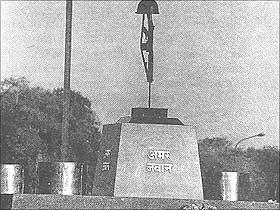 We lost 1,400 men; 4,000 were wounded. The credit for our victory should go to the officers and men who fought gallantly against stiff resistance by the Pakistanis.
We lost 1,400 men; 4,000 were wounded. The credit for our victory should go to the officers and men who fought gallantly against stiff resistance by the Pakistanis.
Due credit must go to Indira Gandhi who displayed courage and determination throughout the crisis. She stood up to (US President Richard M) Nixon and the UN, and led the country to its greatest victory.
We took 93,000 prisoners. The rifle and bayonet at the Amar Jawan memorial in New Delhi belong to an unknown soldier who gave his life in the Jessore sector.
Let us not forget their sacrifice.








